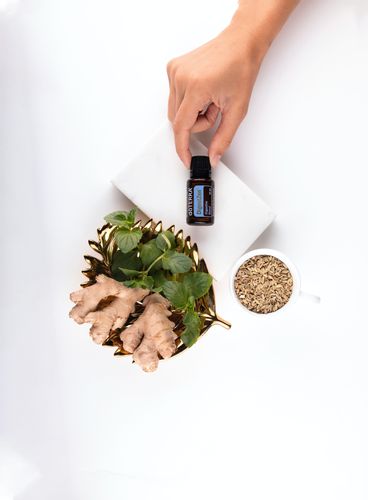Overview
| | Anti-microbial | Anti-fungal | Anti-parasitic | Digestive Aid | Probiotic |
| Apple Cider Vinegar | Y | Y | | | |
| Bone Broth | | | | Y | |
| Coconut Oil | | Y | | Y | |
| Cooked Vegetables | | | | Y | |
| Ghee | | | | Y | |
| Ginger | Y | Y | Y | Y | |
| Peppermint | | | | Y | |
| Pumpkin Seeds | | | Y | Y | |
| Slippery Elm | | | | Y | |
| Yogurt | | | | | Y |
1. Apple Cider Vinegar
While there are many uses and health benefits of apple cider vinegar, the way it's thought to help leaky gut is by killing the yeast. If you suffer from candida and it's contributing to your symptoms of leaky gut, a tonic of apple cider vinegar may help restore some balance to your gut.
Apple cider vinegar also has natural antimicrobial properties, meaning it kills the bad bacteria in your gut and helps restore the natural balance of good bacteria in your intestines.
Some experts recommend a tablespoon added to some warm water. You may also add a squeeze of lemon for taste. You may put it on your meat before you eat it to help pre-digest it.
2. Bone Broth
Do you remember the days when you were sick to your stomach and mom made you some broth? Because it's mostly liquid, the broth is easy for your digestion. But it's the collagen in bone broth that people attribute to healing leaky gut. Collagen increases the production of gastric juices in your gut and helps restore the lining of your digestive tract.
3. Coconut Oil and Coconut Butter
Coconut oil is very stable and may be used as a substitute for other oils when you bake, saute, roast, or fry. Coconut oil is useful to heal leaky gut if you're suffering from candida. This is because coconut oil has anti-fungal properties which may help inhibit candida growth and support healthy digestion. Unrefined and extra virgin coconut oil is best. Coconut butter can be used in baking as an alternative to dairy butter.
4. Cooked, Organic Vegetables
While eating raw vegetables is certainly vogue in health circles, raw vegetables can be hard to digest for people suffering from leaky gut and may make symptoms worse, especially gas and bloating. Cooking your vegetables can help assist indigestion. Purchasing organic vegetables will assure the food you're eating is free from pesticides which may further harm your digestive tract.
In addition, eating fermented vegetables like miso, kombucha, pickles, sauerkraut, kimchi, and kefir may also provide your gut with important microorganisms and bioactive enzymes to help aid in healthy gut lining and digestion.
5. Ghee
If your leaky gut symptoms are made worse from dairy products, then ghee offers a good alternative to butter. Ghee is purified butter and doesn't contain lactose or whey. Ghee also contains Omega 3.
6. Ginger
Ginger has anti-bacterial, anti-fungal, and anti-parasitic properties which make it great for people suffering from leaky gut. It may also help reduce feelings of nausea you may be experiencing. Another benefit of ginger is that it improves the production of gastric juices, including stomach acid, bile, and pancreatic enzymes to aid in digestion.
Drinking some ginger tea or adding fresh ginger to your meals can be a great way to add this healing food to your diet.
7. Peppermint
Peppermint tea is good for digestion and helps stimulate the production of gastric. While you may drink peppermint tea there are also time-released peppermint capsules that will allow the peppermint to move through the stomach and into the intestines before they're released, where they will have the most impact on your intestinal health.
8. Pumpkin Seeds
Pumpkin seeds are filled with nutrients that help with digestion. If you suffer from any kind of parasites, pumpkin seeds contain natural anti-parasitic properties.
9. Slippery Elm Tea
Slippery elm tea is used to reduce inflammation in the gut which helps reduce the occurrence and severity of leaky gut symptoms. It may also help people suffering from IBS, IBD, or other digestive disorders.
10. Yogurt
Yogurt can be a great choice to help heal leaky gut syndrome, but not all yogurts are created equal. What makes yogurt good for your gut is the probiotic bacterium, Lactobacillus acidophilus. While there are many different strains of a probiotic bacterium, not all yogurts have them. So while some yogurt is still a good source of protein, calcium, magnesium, and zinc, some do not contain the probiotics to help heal your gut. Some brands you might consider include Chobani, Dannon, or Yoplait.





















